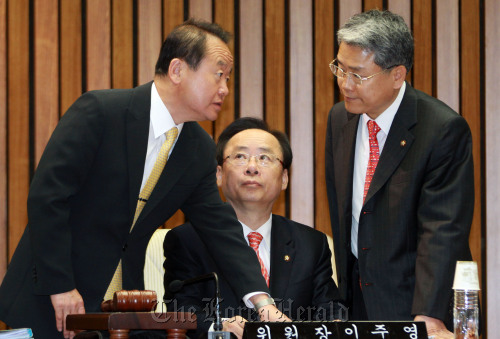Measure to ban ex-judges, prosecutors from practicing law in 'cool-off' period
The National Assembly committee on legal reform will submit this month a bill to revise the Lawyers’ Act to bar former judges and prosecutors from practicing law for a period of time after retiring.
“It is urgent to take measures to root out the long-standing practice of offering career favors to former judges and prosecutors,” said Rep. Lee Ju-young, chairman of the committee on Wednesday.
“We have thus agreed to submit the revision bill and have it passed within the April plenary session.”
It has been a widely accepted practice here for reputed judges and prosecutors to move on to law firms or open their own offices upon retirement, taking exceptionally high legal fees in return for their experience and connections within legal circles.
 |
Lee Ju-young (center), chairman of the National Assembly committee to reform the court and prosecution system, discusses meeting procedure with Joo Sung-young (left) of the ruling Grand National Party and Kim Dong-cheol of the main opposition Democratic Party in the National Assembly on Wednesday. (Yonhap News) |
Former prosecutor and presidential aide Chung Tong-ki was forced to resign as chairman nominee of the Board of Audit and Inspection earlier this year over his income earned as a prosecutor-turned-lawyer.
The committee also pledged to obligate law school graduates to a six-month probationary period after passing the lawyer’s exam before opening their own offices.
Currently, they are under no such obligation, which has prompted opposition from Judicial Research and Training Institute members, who undergo an internship in the judiciary, prosecution and law firms before graduation.
The parliamentary committee’s vigorous moves on these two issues, however, came after the members earlier failed to reach agreement on the top major issues, such as the abolishment of a disputed prosecutorial investigation body.
The committee sent out a notice to the Supreme Prosecutor’s Office on Monday, demanding that it shut down the Central Investigation Department and thus revise its related ordinance.
The prosecution and the Justice Ministry, however, immediately struck back, refusing to comply.
“The legislature is not entitled to order the shutdown the affiliated organ of the judicature,” said a prosecution official.
Prosecutors also said that CID was a unique body which takes charge of complicated economic and political crime cases and that its role is irreplaceable.
It is the firm stance of the committee, nevertheless, that the CID is prone to becoming a politically motivated organ and that it should thus be abolished.
However, in consideration of the intense debate involved, the issue will be delayed until May, shortly before the June parliamentary plenary session, officials said.
Regarding the proposed increase in the number of Supreme Court justices, the opinions of the committee members were divided.
“A Supreme court justice is burdened with some 2,600 cases per year, which allows them to spend only a limited length of time on each of them,” said Rep. Roh Chul-rae of the minority Future Hope Party.
However, other members suggested more caution before causing any change to the current organization of the Supreme Court, which is one of the core constitutional organs.
The total number of justices, as stated by the Court Organization Act, is 14.
By Bae Hyun-jung (
tellme@heraldcorp.com)







![[Today’s K-pop] Blackpink’s Jennie, Lisa invited to Coachella as solo acts](http://res.heraldm.com/phpwas/restmb_idxmake.php?idx=644&simg=/content/image/2024/11/21/20241121050099_0.jpg)
